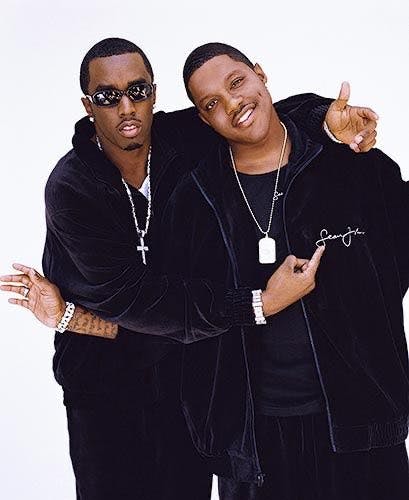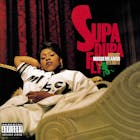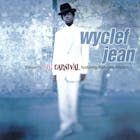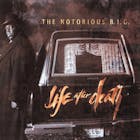
Classic Albums: 'No Way Out' by Puff Daddy & The Family
Classic Albums: 'No Way Out' by Puff Daddy & The Family
Published Wed, December 31, 1969 at 7:00 PM EST
For Sean Combs, 1997 was a year of staggering highs and crippling lows.
His label Bad Boy Entertainment was riding a strong wave of successes. Since it's launch in 1994, Bad Boy had seen platinum sales for projects by Craig Mack, Total, 112, Faith Evans and, most notably, The Notorious B.I.G. 1997 was forecasted to be a stellar year for the label, with the highly-anticipated release of Biggie's sophomore album Life After Death. But everything turned on the morning of March 9, when The Notorious B.I.G. (born Christopher Wallace) was shot and killed at an intersection in Los Angeles. The death sent Sean "Puffy" Combs reeling.
Puff would famously release the tribute "I'll Be Missing You" in the spring after Biggie died. The song interpolates "Every Breath You Take" and served as an elegy for his famous friend. It would become one of the biggest singles of all time, and it set the stage for how Puff was going to re-emerge following the tragedy.
The murder of The Notorious B.I.G. cast a dark cloud over Hip-Hop and the music industry overall, but nowhere was it more felt than with Bad Boy Records. The larger-than-life rapper was their signature star and most visible voice, and he'd been the catalyst for pushing Sean "Puffy" Combs to pursue his longtime dreams of being an artist. Puff had been the man who'd guided B.I.G.'s rise, and it was appropriate that it was Biggie who'd encouraged Combs to fulfill his rapper ambitions. Now, in the wake of Biggie's death, Puff now sat in the uncomfortable position of carrying the torch for his friend and his record label.

Things had been set in motion before the tragedy in Los Angeles: after the campaign for Life After Death began in earnest, things were to kick into high gear with the push for Puff Daddy's debut album, then titled Hell Up In Harlem. After two years of successful R&B releases by acts like Faith Evans, 112 and Total, Puffy's project was going to reaffirm Bad Boy as a Hip-Hop label, and serve as a coming-out party for new label talents like Yonkers trio The LOX, and solo Harlem rappers Black Rob and Ma$e.
That spring, Puffy delivered his first single from the forthcoming album. "Can't Nobody Hold Me Down" was the Bad Boy formula buffed to shimmering perfection: as Puff and his new protege deliver ballerific raps over a familiar sample, this time "The Message" by Grandmaster Flash & The Furious Five. The music video would be the kind of Hype Williams-directed affair that would soon take over 1997, as Biggie opened things with an intro that featured comedian/actor Eddie Griffin. It would be B.I.G.'s final music video appearance.
DROP YOUR EMAIL
TO STAY IN THE KNOW
“I was ready to quit; I wasn’t gonna put out any more [Bad Boy] records. Then I was watching TV one day—you know, one of those times of despair where nobody is around, and you’re like crying on the floor. The self-pity is at an all-time high, and you’re asking God ‘why?’ and then I just heard 'Every Breath You Take' by The Police. I just took it as a sign. Sometimes you just need that little bit of light to be able to express yourself. But I [then] thought that the best thing I could do was not give up. I was down, and I was out, but I wasn’t finished. All I could do was get up and start to fight. That’s the way Big would’ve wanted it.”
Eventually, Hell Up In Harlem became No Way Out, and Puffy's debut album was going to be a showcase for the other rappers who were now on the Bad Boy roster. The LOX was a trio out of Yonkers who'd formerly called themselves "The Warlocks," and Styles P, Sheek Louch and Jadakiss were ready to blow after a high-profile appearance on "Last Day" from Biggie's Life After Death. Black Rob was a gruff street emcee from Harlem, a grimy lyricist who echoed the grittiness of early B.I.G.; and Ma$e was a young playboy from Harlem who'd been making noise with his friend, then-unknown Harlem rapper Cam'ron.
Puff had turned the Bad Boy machine into a sleek hit factory; and with the platinum-selling debut albums from Bad Boy's R&B stars, he'd shown that his talent for radio-friendly smashes was very much intact. He was now also serving as executive producer for a new Mariah Carey project, so Puff's hands were beyond full.
"When I’m working with people, I’m not like Puff Daddy," he explained to Rolling Stone. "I’m not like a star or nothing. I’m like any other producer – I’m working for somebody. I don’t really have no ego. I try to get whatever somebody needs – like, if somebody needs me to make them some tea. I’m also a fan: I’m like, “Dang, I’m working with R. Kelly; I’m working with Boyz II Men; I’m working with Mariah.”

Ma$e was ready for his moment. After making his debut on 112's "Only You" remix and offering a star-making turn on Biggie's "Mo Money, Mo Problems," the young emcee would become Puff's partner-in-rhyme for much of No Way Out. Now, instead of Puff always shadowing B.I.G.; he would have Ma$e as his own right-hand guy.
"Before I met Puff, I was sleeping on the floor of a one-bedroom apartment in Harlem, splitting White Castle," Ma$e told GQ in 2014. "You know how small White Castle burgers are, right? My man Cudda sold his Acura so we could fly down to Jack the Rapper [an Atlanta hip-hop convention]. We was going to meet Jermaine Dupri, but they wouldn’t let us speak to him. Then I bumped into Puff on the dance floor."

We was going to meet Jermaine Dupri, but they wouldn’t let us speak to him. Then I bumped into Puff on the dance floor."
- Ma$e on how he connected with Puff Daddy (GQ interview, 2014)
"Can't Nobody Hold Me Down" and "I'll Be Missing You" proved to be the perfect catalyst for No Way Out. When the album was released in July of 1997, it instantly became a sensation. On the strength of its monster hit singles, No Way Out would eventually sell seven million copies in the United States alone. "I Been Around the World" flipped David Bowie's hit "Let's Dance," and the music video featured a lengthy spy subplot and cameos from celebs like Quincy Jones and Wyclef Jean. It shot to No. 2 in the early fall of that year.
Hit single "All About the Benjamins" would become an anthem for the label, and a mantra that seemed to sum up what detractors were now calling "The Shiny Suit" era. On the heels of the murder of the Notorious B.I.G., (and 2Pac, who'd been killed just six months prior), there was a sense that Hip-Hop needed to go lighter. And Puff Daddy seemed to be the guy most enthusiastically holding the match.
"After Big died, we were searching to see who was gonna carry the torch," Ma$e would recall. "Everybody would’ve had the right to get out of contracts because of the violence. Instead, we rolled together. If I had a verse or beat that was better for you, I’d just give it up. My verses on Puff’s first few singles from No Way Out were records I wrote in that one-bedroom apartment in Harlem before I even got to the label. I gave them to Puff, because he was the one with the hot hand."
No Way Out would cement Bad Boy Records as the biggest label in rap music circa 1997; Death Row Records had begun it's surprisingly fast slide into irrelevance, and though southern labels like No Limit and Cash Money Records were on the rise, they weren't dominating the charts the way Puffy and Co. now were. With high-profile success came criticism: many dismissed Puff's abilities as a producer, pointing to the talents of his cadre of Hitmen, as well as Bad Boy's over-reliance on sampling familiar hits for songs like "Can't Nobody Hold Me Down" and "Been Around The World."
"There’s a misconception that I have this big record collection," he would tell Rolling Stone. "It’s not a plan, like, 'Let me take all these records from the ’70s and ’80s, greatest hits off the TV, sample them and have somebody rap on them.' It’s not easy to use a hit record and make it become a hit that sells 2 million copies. Try it – be my guest, go sample … what’s a big record I could sample?"

I was down, and I was out, but I wasn’t finished. All I could do was get up and start to fight. That’s the way Big would’ve wanted it.”
- Diddy, (HIP-HOP EVOLUTION, 2019)
"I'll Be Missing You" and No Way Out turned Puffy into a superstar in his own right. His status as rap's most spotlight-hungry producer/manager had been famously mocked by Suge Knight at the 1995 Source Awards, but he was now drafting a blueprint for so many to follow into the 2000s. As Y2K dawned, producers like Pharrell and Swizz Beatz were as high-profile as the artists they were producing. That heightened visibility was largely a product of what Puff Daddy spawned in 1997. The producer-as-star would become something of an albatross for Hip-Hop (and music, in general); but there was a time when there was something novel and fresh about the labelhead being "all in the videos...all on the record...dancin.'"
Puff would sustain his notoriety and business successes over the next 25 years, even if he never had a musical moment quite like No Way Out again. It was a seminal moment for Bad Boy Records, a moment when the label emerged out from under the shadow of The Notorious B.I.G.'s murder (and his success, if we're being honest) to prove that this label was most definitely a Hip-Hop powerhouse, on par with what Death Row had done on the West Coast. By the end of 1997, Ma$e and The LOX would join Puff and B.I.G. as platinum-sellers, and Bad Boy would sit alone atop the rap game.
At least for the moment.






